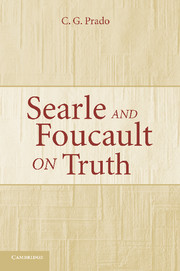3 - Foucault
Published online by Cambridge University Press: 03 December 2009
Summary
Discipline and Power
Foucault enjoys a degree of fame that extends well beyond the spheres of philosophy and history, the two disciplines that most justifiably can claim him as their own. James Miller says that “[a]t the time of his death…. Michel Foucault was perhaps the single most famous intellectual in the world” (Miller 1993, 13). Alan Ryan does not qualify, saying that at his death Foucault “was the most famous intellectual figure in the world” (Ryan 1993, 12). David Macey makes the more modest claim that Foucault “was without doubt France's most prominent philosopher,” but adds that Foucault's international reputation “almost eclipsed his reputation in France” (Macey 1993, xi).
Foucault is a thinker whose canon was shaped by the work of Nietzsche and Heidegger, Husserl and Saussure. His intellectual growth took place in a context rich in philosophical alternatives, most of them influenced by Marxism. And as Searle was personally influenced by Austin, a major contributor to analytic philosophy, so Foucault was personally influenced by Canguilhem, an important contributor to Continental philosophy. These various influences prompt Hubert Dreyfus and Paul Rabinow to argue that to understand Foucault one must triangulate him among phenomenology, hermeneutics, and structuralism (Dreyfus and Rabinow 1983).
Foucault's thought and intellectual options were most immediately shaped by Merleau-Ponty's interpretation of Husserl's phenomenology, Gadamer's Heideggerian hermeneutics, and Lévi-Strauss's Saussurean structuralism.
- Type
- Chapter
- Information
- Searle and Foucault on Truth , pp. 66 - 103Publisher: Cambridge University PressPrint publication year: 2005



